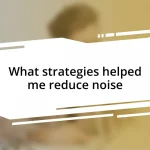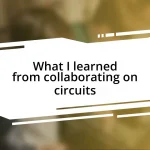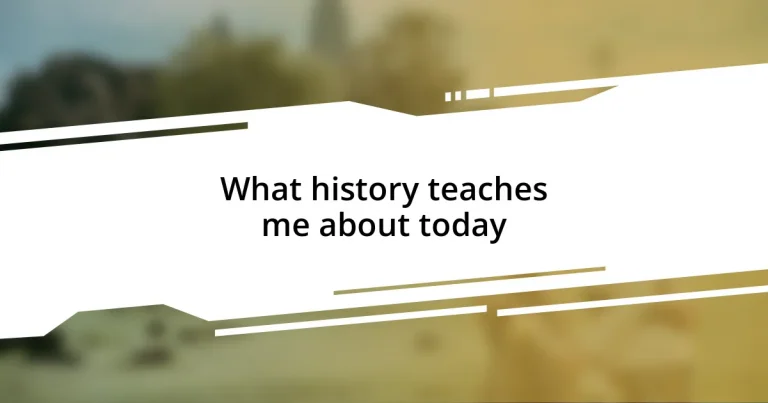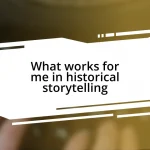Key takeaways:
- The struggle for civil rights throughout history inspires collective action and emphasizes the importance of standing up for justice today.
- Lessons from past mistakes, such as the Great Depression and Chernobyl, highlight the significance of regulation, accountability, and safety protocols in avoiding future crises.
- Social movements showcase the power of grassroots organizing and the importance of individual contributions toward societal change.
- Building resilience through community support and local initiatives can transform challenges into opportunities for growth and collaboration.
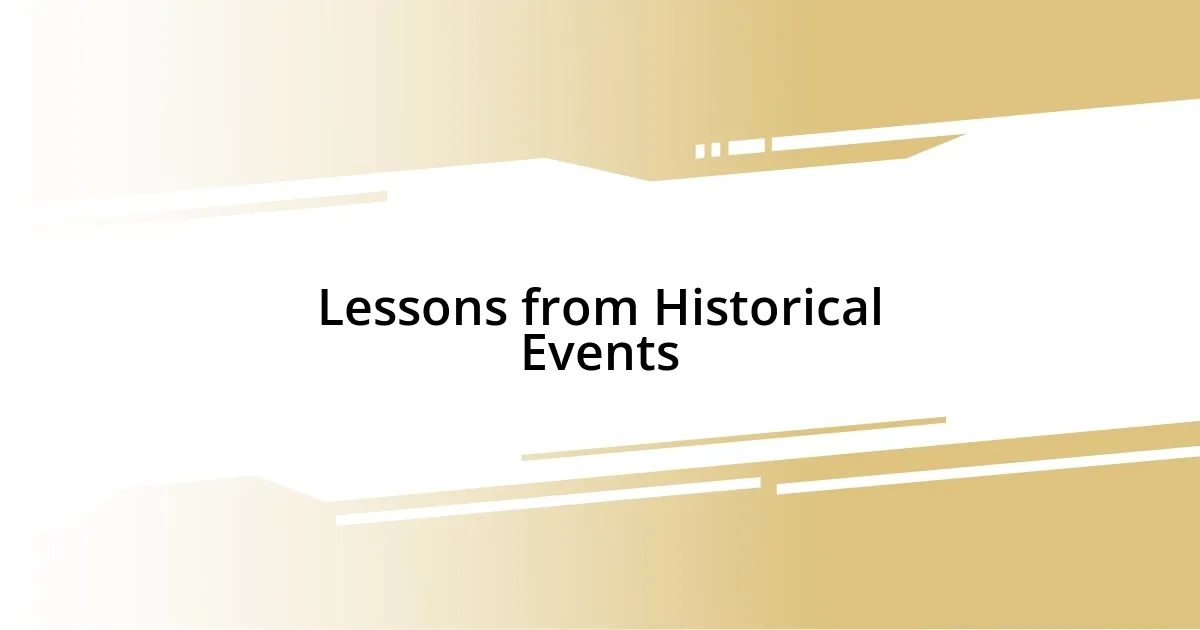
Lessons from Historical Events
Throughout my explorations of history, I’ve often been struck by how the struggle for civil rights has echoed through the ages. For instance, when I learned about the Civil Rights Movement, the sheer bravery displayed by individuals like Rosa Parks and Martin Luther King Jr. really resonated with me. Their unwavering dedication inspires me to consider: how far am I willing to go to stand up for justice today?
One striking lesson is about the impact of choices we make in times of crisis. During World War II, leaders faced decisions that altered the course of nations. Reflecting on this, I’ve thought about how small daily choices can ripple outwards, affecting more than just myself. It makes me question: are we aware of the consequences that our actions might have on those around us?
Looking at the fall of great empires, like the Roman Empire, I see a poignant reminder of the dangers of complacency. Their eventual decline teaches us about the importance of adaptability and foresight. I can’t help but feel a twinge of urgency to continuously learn and evolve—are we, as a society, paying enough attention to the signs around us?
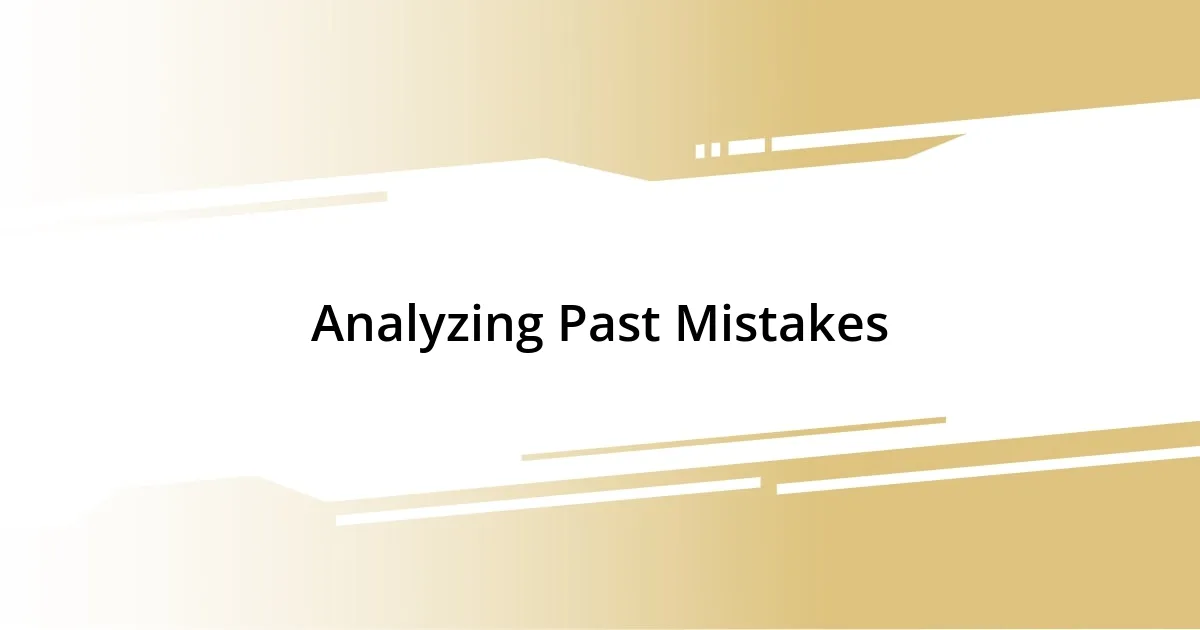
Analyzing Past Mistakes
Analyzing past mistakes can reveal so much about our current actions. For instance, when studying the Great Depression, I was struck by how a lack of regulation in the banking sector led to widespread economic ruin. Reflecting on my own financial decisions, it reminds me to never overlook the importance of prudent management and oversight in any aspect of life.
As I delved into the causes of the Vietnam War, I couldn’t help but recall my own experiences with conflicts in relationships. The miscommunication and lack of clarity illustrated in history echo similar failures I’ve had, reminding me that avoiding accountability can have long-lasting repercussions. It’s a lesson that encourages me to prioritize transparency and open dialogue today, both in personal and professional spheres.
Then there’s the tale of Chernobyl, which is haunting in its implications. I remember reading about that catastrophic failure and the absence of proper safety protocols. It hit home for me when I think about the importance of rigorous checks in my workplace. This historical mistake stirs a sense of responsibility within me to ensure that my actions contribute to a safer environment for everyone.
| Historical Event | Lesson Learned |
|---|---|
| The Great Depression | Importance of financial regulation |
| Vietnam War | Need for accountability and communication |
| Chernobyl | Significance of safety protocols |
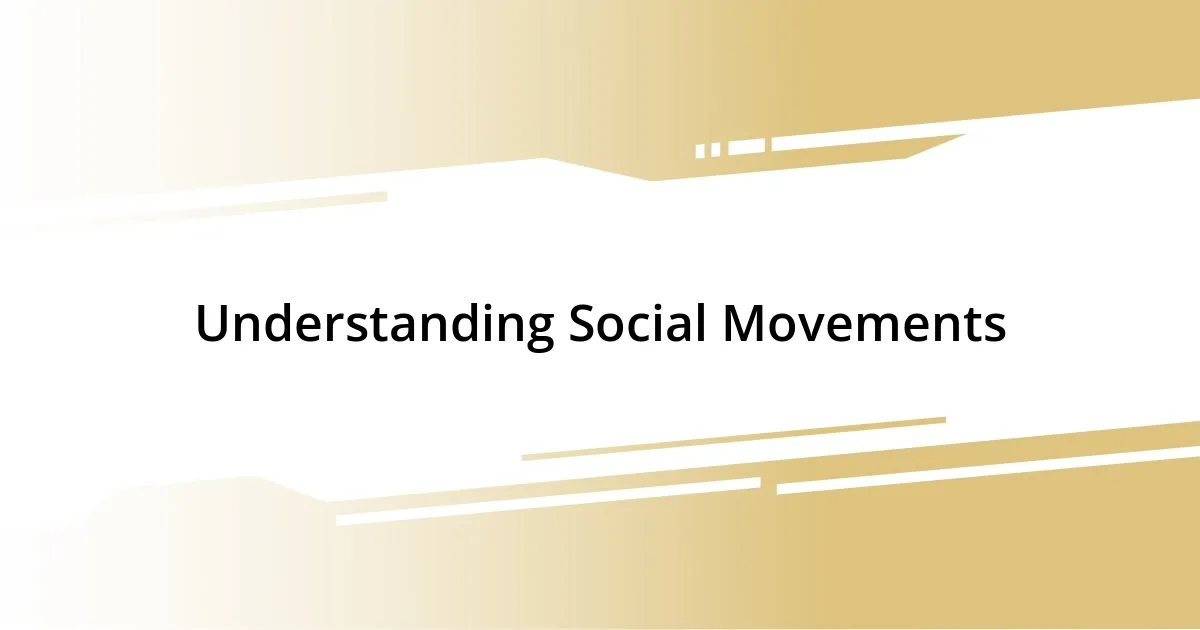
Understanding Social Movements
Understanding social movements has always fascinated me. They embody the collective will of people coming together to advocate for change. I often reflect on my own experiences, like participating in local environmental clean-up efforts, where I witnessed how a small group can spark wider conversations about sustainability. It’s empowering to see how grassroots mobilization can lead to significant policy changes down the line, reminding me that every voice counts.
- Social movements often arise from a shared sense of injustice or inequality.
- Grassroots organizing can amplify messages and reach a broader audience.
- Social media plays a pivotal role in modern movements, spreading awareness quickly.
- Historical movements, like Women’s Suffrage and LGBTQ+ rights, highlight the importance of perseverance.
- They teach us that while progress can be slow, persistent efforts can lead to monumental shifts in society.
In my journey, I’ve felt a compelling connection to movements focused on racial justice, particularly after attending a local rally. The fervor in the air was palpable, and I found myself standing alongside those who believed in creating a fairer world. It made me recognize how historical figures like Malala Yousafzai and Nelson Mandela serve as symbols of resilience and determination. Their stories inspire many of us to challenge the status quo and foster inclusivity in our communities. Understanding these movements helps me appreciate the complex fabric of society and reminds me to actively engage in shaping a better future.
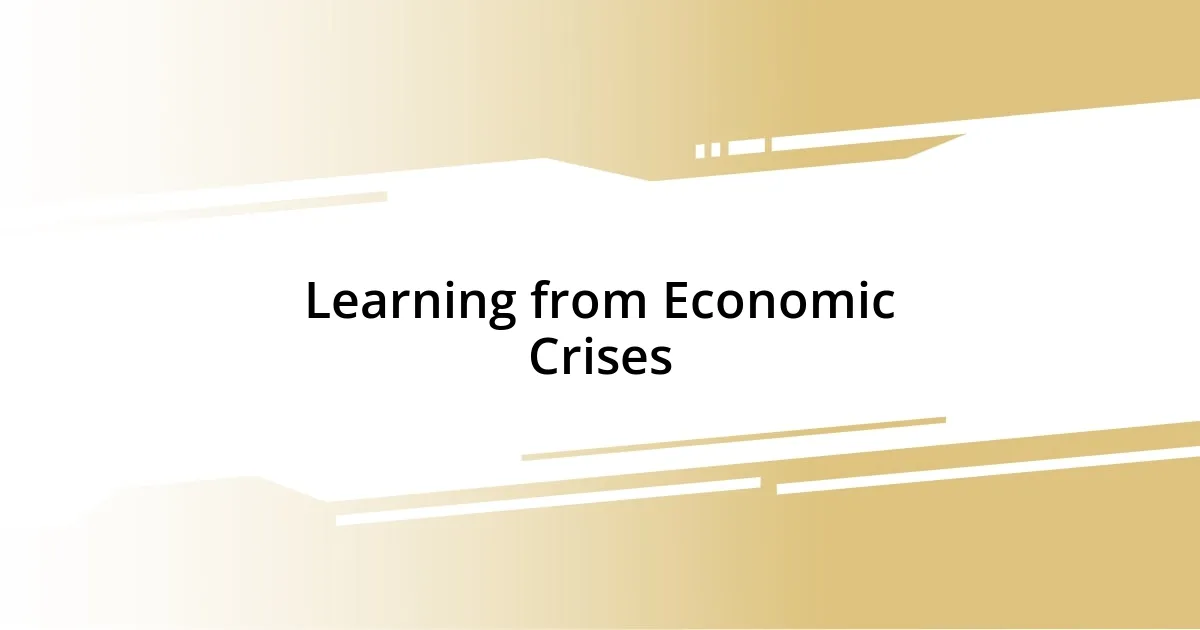
Learning from Economic Crises
Learning from economic crises has always reminded me of the fragile dance between consumer confidence and market stability. Reflecting on the 2008 financial crisis, I can’t help but recall standing in line at a bank, feeling the palpable anxiety in the air as people worried about their savings. It’s remarkable how a seemingly distant event can resonate with my own financial choices, urging me to be more cautious and aware of economic signals.
Another profound lesson comes from the Latin American debt crisis of the 1980s. It’s interesting how countries often borrowed beyond their means, only to be met with severe austerity measures. When I think about this, I draw parallels to my own experiences with budgeting. Have I ever overreached financially? Absolutely. This historical insight pushes me to live within my means and be wary of tempting offers that promise quick gains without considering long-term implications.
Lastly, the economic collapse in Zimbabwe serves as a powerful reminder of hyperinflation’s devastating effects. Watching news footage of people struggling to afford basic necessities made me realize the importance of sound monetary policy. I remember chatting with a friend about how easily values can spiral out of control. It convinced me to appreciate the stability we often take for granted and remain vigilant in advocating for economic responsibility, both personally and in our broader community.
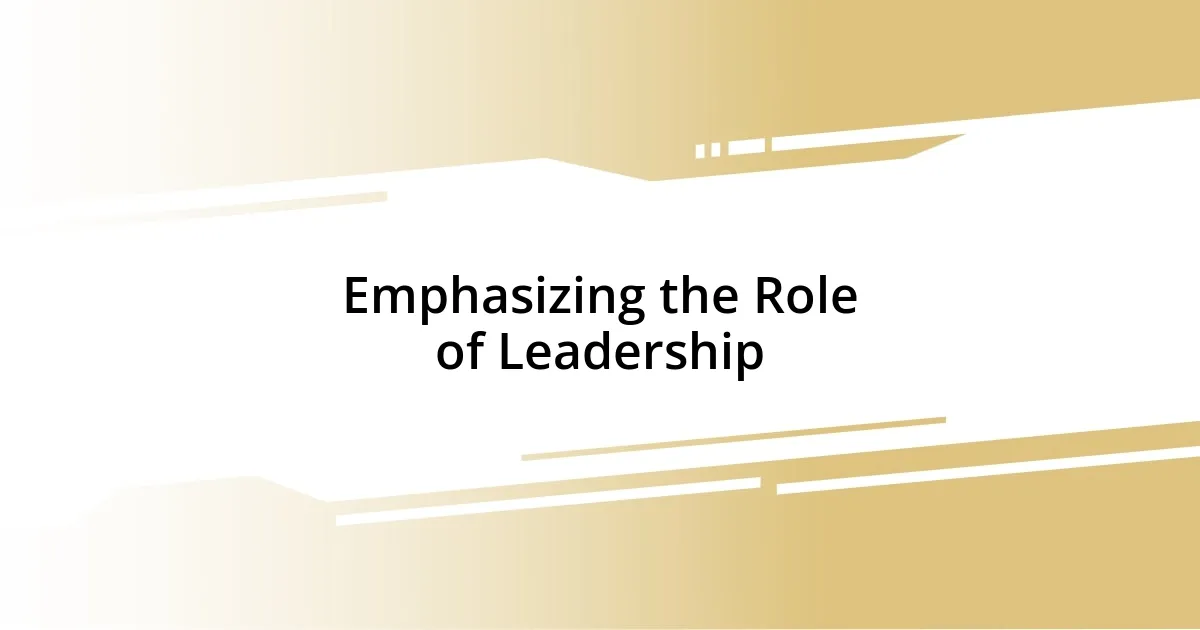
Emphasizing the Role of Leadership
Leadership can significantly shape the trajectory of social movements and inspire meaningful change. I often think about my role in organizing a community event where we advocated for local park improvements. That experience highlighted how effective leaders can galvanize people’s passions, turning abstract concerns into actionable plans. I still remember sitting around a table, brainstorming ways to connect with neighbors, realizing that leadership isn’t just about authority; it’s about cultivating motivation and trust among individuals.
Reflecting on historical leaders like Martin Luther King Jr. evokes a powerful sense of responsibility within me. His ability to communicate a vision and unite diverse groups reminds me of the potential we all have to inspire others in our communities. Have I ever felt that kind of responsibility? Absolutely. I recall a time when I spoke at a local forum about community safety; the nervous excitement I felt before taking the stage was surreal. That moment reinforced in me how impactful compassionate leadership can be—it’s not just about being heard, but about amplifying the voices of those who often go unnoticed.
Moreover, the leadership exhibited during recent movements, like the climate strikes led by young activists, strikes a chord with me. It’s awe-inspiring to witness youth stepping up to challenge powerful institutions. I think about how pivotal it is for each of us to embrace our leadership potential, no matter how small our sphere of influence may seem. This has prompted me to consider: how can I lead through my daily actions? These reflections remind me that effective leadership often stems from empathy and a genuine desire to uplift others, which I strive to embody in my interactions and engagements.
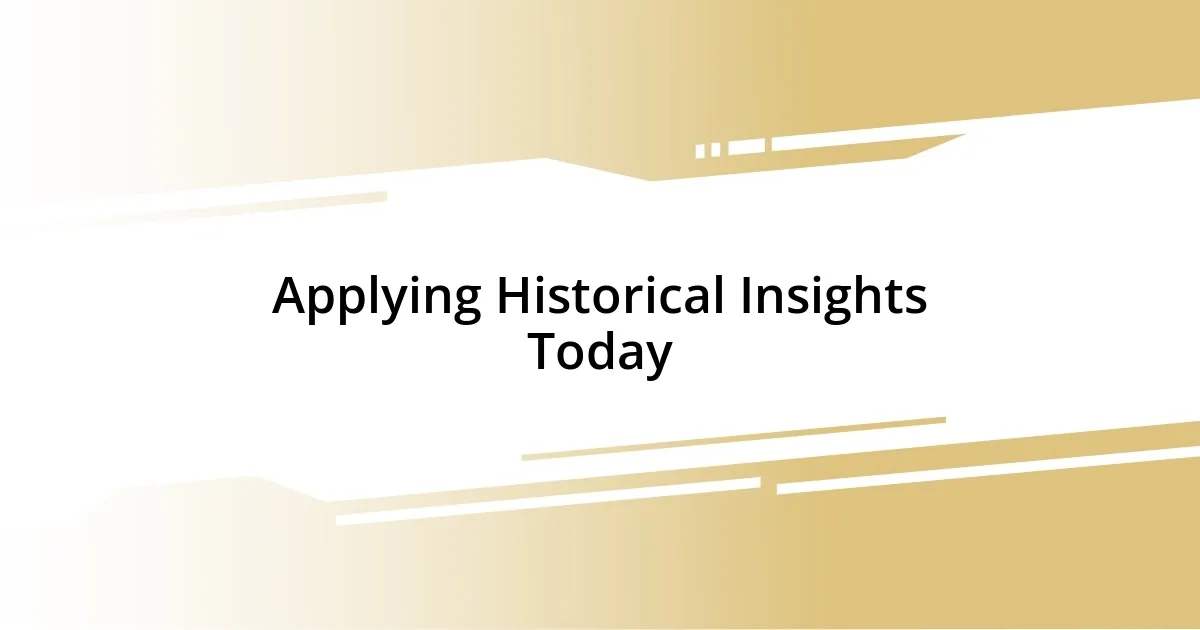
Applying Historical Insights Today
Applying historical insights today allows me to make more informed decisions in my life. For instance, the lessons from the civil rights movement make me pause when I see social injustices today. I can’t help but reflect on a protest I attended last summer. There, surrounded by passionate voices advocating for change, I felt a strong sense of duty to continue the fight for equality and justice. It served as a reminder that every action, no matter how small, contributes to a larger narrative of resistance and progress.
I often find myself thinking about the environmental movements of the past and how they shape my actions today. When I recall the early conservationists who fought tirelessly for our natural resources, I feel a responsibility to reduce my own carbon footprint. For example, I made a commitment to use public transportation more frequently, realizing how much change can stem from individual choices. Have I noticed a difference? Absolutely! Each time I make a sustainable choice, I feel a connection to those who fought for our planet’s future.
In contemplating the economic reforms initiated after the Great Depression, I recognize the importance of policy in strengthening society. During an economic downturn in my own life, I remember questioning how I could secure my future. Learning about the New Deal programs inspired me to advocate for policies that support community resilience today. It raises a thought: how can I be part of this collective effort? Engaging with my local representatives and participating in civic discussions has become part of my weekly routine, motivating me to channel historic lessons into proactive measures for a brighter future.
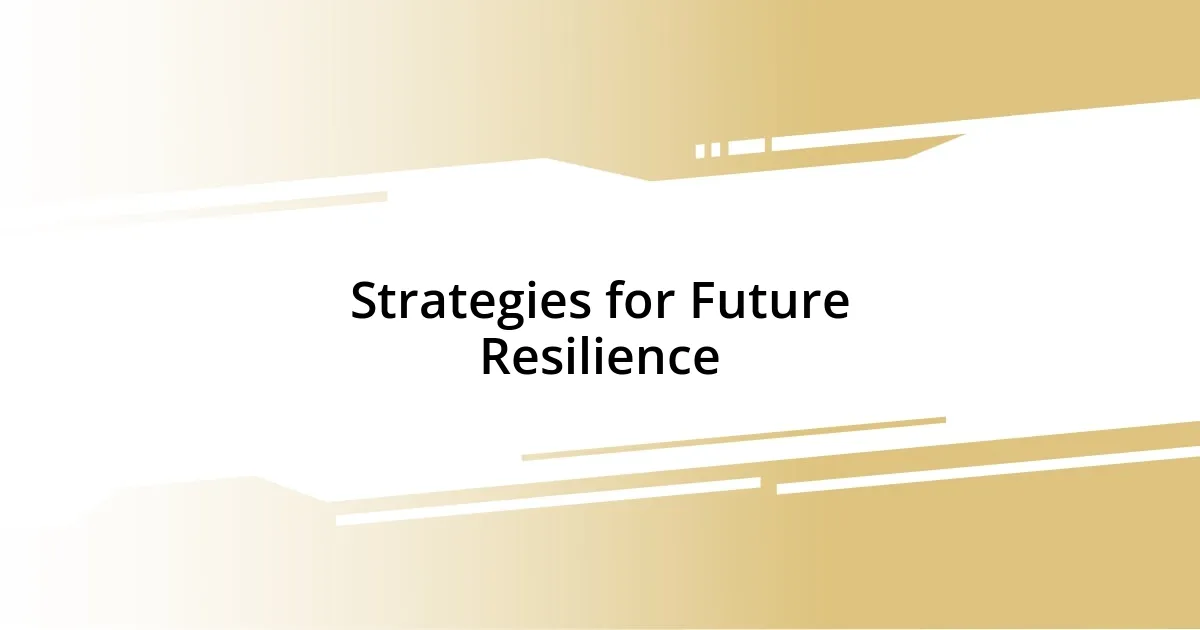
Strategies for Future Resilience
Focusing on resilience, I often draw inspiration from past events where communities rallied together in times of crisis. The way neighborhoods banded together during major natural disasters reminds me of when my own community faced a severe storm last year. We set up a group chat to share resources and check in on each other, showcasing how collective support can make a real difference in recovery. I wonder: what would happen if we approached everyday challenges with this same sense of unity?
Looking at historical instances of economic hardship, I realize that fostering adaptability is crucial. During the recession, people had to find innovative ways to thrive, whether through side gigs or community bartering systems. I attempted something similar by organizing a skill-share event with local friends, where we exchanged expertise in everything from cooking to carpentry. It was eye-opening to see how collaboration can create a network of support, reinforcing my belief that resilience flourishes when we pool our talents. How can we keep this momentum going? By celebrating each other’s strengths, we build a safety net that can withstand future storms.
Lastly, learning about the transformative power of grassroots movements has prompted me to embrace my own local initiatives. I recall attending a workshop on community gardening, where we not only learned about sustainable practices but also how such projects can foster lasting connections. This experience made me realize that even small changes can lead to impactful outcomes. How often do I see these initiatives thriving right in my neighborhood? More frequently than I thought! By engaging in local projects, I discover that resilience doesn’t have to be grand; it can exist in the quiet determination of individuals coming together for a shared purpose.

